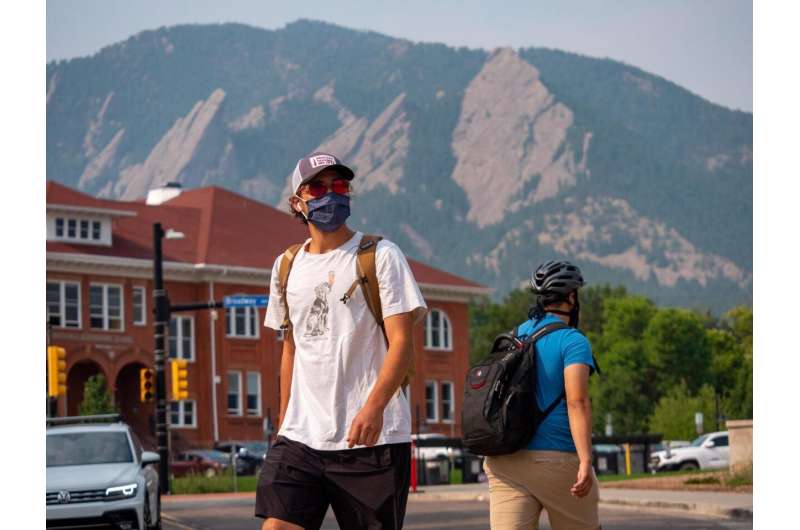Q&A: Even outdoors, why face coverings are important

CU Boulder Today chatted with chemistry Professor and CIRES Fellow Jose-Luis Jimenez about why it's so important to wear a face covering—even when you're outdoors. For starters, Jimenez said you can think of the virus like smoke. Imagine people around you smoking cigarettes. If you would be able to smell that smoke, you may not be completely safe.
"We've all seen smoke on a windy day or in a smoky room," Jimenez said. "We need to think about where the smoke would move." Now, to our questions. (Listen to Jimenez and mechanical engineering Professor Shelly Miller talking about indoor air ventilation on Science Friday).
So, just to get this out of the way, do face coverings work?
Face coverings work. Basically, face coverings reduce how many viruses an infected person puts into the air, and they also reduce how many viruses a susceptible person will inhale. They reduce both.
There seems to be growing evidence that, during this pandemic, you're safer outside than inside. Is that the case?
There's one study that says a person is 20 times less likely to be infected outdoors than indoors. It's very clear in data collected around super-spreading events, which are these events when one person gets many people infected. There is a database with more than 1,000 events. We see one or two of those that happened outdoors and more than 1,000 indoors. So, it's overwhelmingly clear.
With that said, do you still have to be safe outside—keep your distance from people, wear face coverings?
There are cases of transmission outdoors that have been documented, and they tend to involve people talking in close proximity without face coverings. That's really the situation to avoid. You don't want to be talking to someone in close proximity without a face covering. The approach that is closest to a silver bullet is being outdoors, distanced and with face coverings.
You've also said that it's important not just to wear a face covering, but to wear a face covering that fits well. How so?
If you're thinking about how to block smoke, then you want to block all the gaps, so you want to make sure that you have a face covering that fits well on your face, has more overlap and doesn't leave any gaps. That is a good fit. If there are gaps that you can kind of put your finger around, a lot of the air is going to go through there. Air goes where it takes the least work.
How do you know if your face covering fits well?
When you breathe in, it gets tight to your face. And when you breathe out, it gets further from your face. If it's not doing that, that's a sign your face covering may not fit well.
If we're thinking about, say students on this campus, what's your best advice for how they can keep themselves safe?
All of these things like being outdoors, wearing face coverings or keeping your distance, they're what we call layers of protection. Alone, none of them is a silver bullet. But if you do these three at a time—stay outdoors, wear a face covering and maintain distance—you've got the best protection from the virus for yourself and others. Short of just staying at home, of course, but far more enjoyable and productive.



















